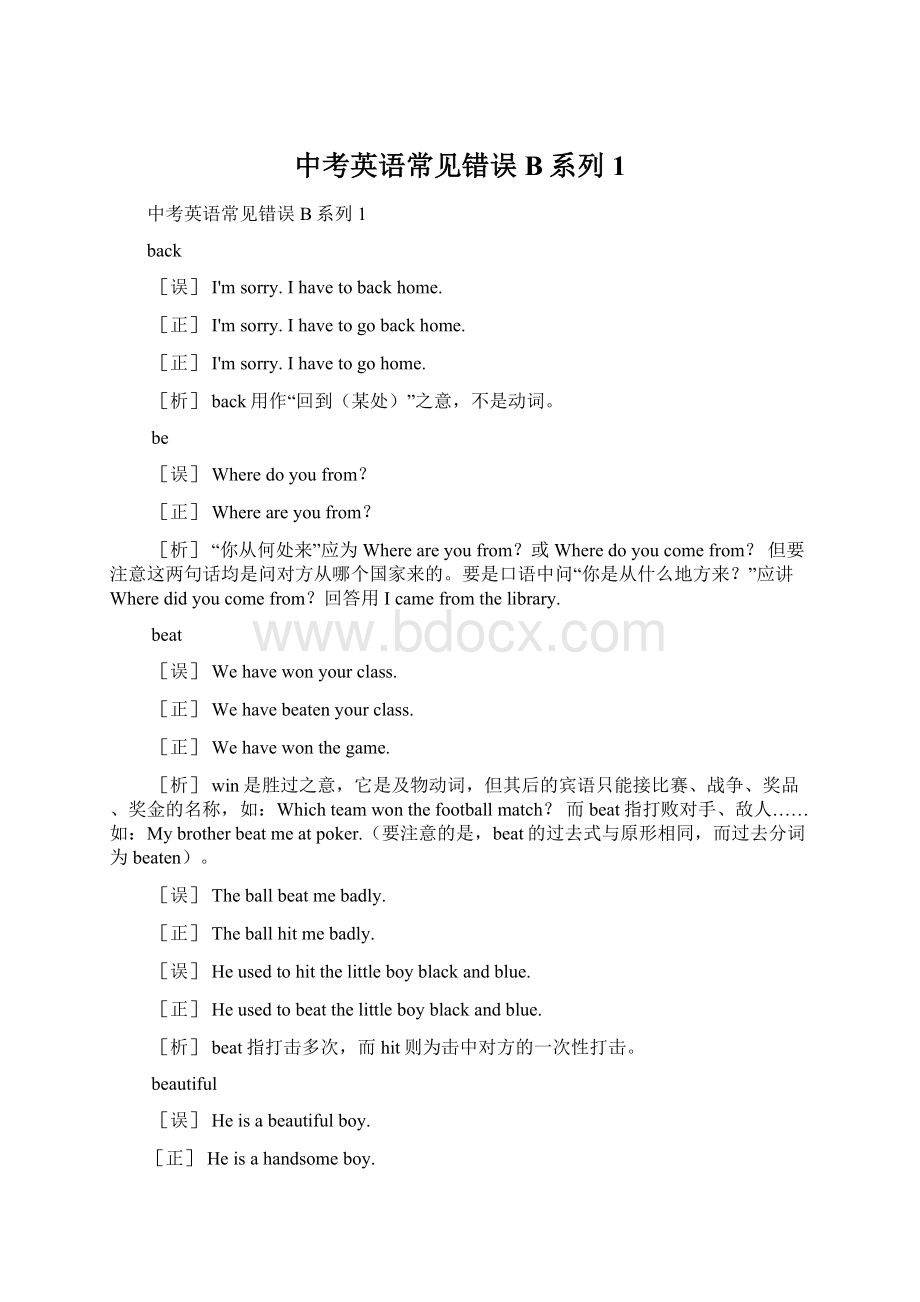中考英语常见错误B系列1.docx
《中考英语常见错误B系列1.docx》由会员分享,可在线阅读,更多相关《中考英语常见错误B系列1.docx(31页珍藏版)》请在冰豆网上搜索。

中考英语常见错误B系列1
中考英语常见错误B系列1
back
[误]I'msorry.Ihavetobackhome.
[正]I'msorry.Ihavetogobackhome.
[正]I'msorry.Ihavetogohome.
[析]back用作“回到(某处)”之意,不是动词。
be
[误]Wheredoyoufrom?
[正]Whereareyoufrom?
[析]“你从何处来”应为Whereareyoufrom?
或Wheredoyoucomefrom?
但要注意这两句话均是问对方从哪个国家来的。
要是口语中问“你是从什么地方来?
”应讲Wheredidyoucomefrom?
回答用Icamefromthelibrary.
beat
[误]Wehavewonyourclass.
[正]Wehavebeatenyourclass.
[正]Wehavewonthegame.
[析]win是胜过之意,它是及物动词,但其后的宾语只能接比赛、战争、奖品、奖金的名称,如:
Whichteamwonthefootballmatch?
而beat指打败对手、敌人……如:
Mybrotherbeatmeatpoker.(要注意的是,beat的过去式与原形相同,而过去分词为beaten)。
[误]Theballbeatmebadly.
[正]Theballhitmebadly.
[误]Heusedtohitthelittleboyblackandblue.
[正]Heusedtobeatthelittleboyblackandblue.
[析]beat指打击多次,而hit则为击中对方的一次性打击。
beautiful
[误]Heisabeautifulboy.
[正]Heisahandsomeboy.
[析]我们可以讲Sheisabeautifulgirl.Thisisabeautifulpark.但要讲男人的"英俊"时要用handsome.
because
[误]ThereasonwhyIwaslateisbecauseIwasill.
[正]ThereasonwhyIwaslateisthatIwasill.
[误]BecauseitwasSunday,sotheparkwascrowded.
[正]BecauseitwasSundaytheparkwascrowded.
[析]这种错误是因为中文的习惯与英语的表述法不同,中文常讲我来晚了的原因是因为我病了,而英文中的第二个因为要用that代替。
又因中文常讲因为……所以……,而英文中用了因为就不能再用所以了,同样用了"所以"也就不要再用"因为"一词。
例如:
Becausewestudyhard,wepassedtheexameasily.或者:
Westudyhardsowepassedtheexameasily.
because、becauseof
because后要接从句,例如:
Welikephysicsbecausewecanlearnalotofnewideas.而becauseof后要接名词作介词宾语,如:
Heisnotatschoolbecauseoftheillness.
before
[误]Wehavetwohourstokillbeforewewillgohome.
[正]Wehavetwohourstokillbeforewegohome.
[析]killtime意为"消磨时光".
英语状语从句中要用一般现在时表示将来的动作。
如:
Ifitrainswewillnotgotothepark.
[误]Ididthisworktwodaysbefore.
[正]Ididthisworktwodaysago.
[析]用ago组成的时间状语其主句中的谓语动词要用过去时,而before引起的时间状语其主句中的谓语动词多用完成时,如:
Ihasdonethisworkafewdaysbefore.
beforelong、longbefore
beforelong是"不久"之意,例如:
IshallgotoAmericabeforelong.而longbefore则是"很久很久"之意,如:
Weknewthisteacherlongbeforewesawhim.(我们在看到这位老师之前很久就知道他了。
)
begin
[误]ThemeetingwillbeginfromMonday.
[正]ThemeetingwillbeginonMonday.
[误]Thefilmhasbegunfortenminutes.
[正]Thefilmhasbeenonfortenminutes.
[析]begin是瞬间动词,所以它的完成时态不能接表示一段时间的状语,如:
Thefilmhasbegun.这句话是对的,即"电影已经开始".但要讲已经开始10分钟了则要用hasbeenon即"上演了10分钟".
begin、start
begin与start两词后面加不定式或动名词都可以,且意思并无区别,但在表达习惯时接动名词的用法较多,如:
HowoldwernyouwhenyoufirststartedlearningEnglish?
但这两个词的进行时态中则多用不定式,如:
Iwasbeginningtogethungry.但如果句子的主语是物而不是人,则多用不定式,如:
Theicebegantomelt.Itstartedtogetdarkbeforewegottoschool.当动词是表达某种心理状态时,要用不定式,如:
Thestudentbegantounderstandhismistakes.
[误]Theystudyhardintheclassfromthebeginningtotheend.
[正]Theystudyhardintheclassfrombeginningtoend.
[析]frombeginningtoend是习惯用法,即自始至终,不要加冠词,但如单独使用则要加冠词,例如:
Atthebeginning,theteachergaveusanexam.
behind
[误]Hemissedtheclassbecausehewasbehindthetime.
[正]Hemissedtheclassbecausehewasbehindtime.
[析]behindtime一短语意为"晚了",而behindthetimes意为"落后于时代".behind是介词同时又是副词,如Comeoutfrombehindthedoor(介词)。
He'salongwaybehind(副词)。
Hefellbehindwithhisclassmates(副词)。
below
[误]What'sthatbelowthechair.
[正]What'sthatunderthechair.
[析]under意为"正下方",而below意为"比……低",或指"在下游".如:
Thereisafallbelowtheriver.(河的下游有一个瀑布。
)其反义词为over,如:
Thereisabigplaneflyingoverthecity.但在"下面的例子"一表达语中则要用theexamplebelow,而不要用under.
beside
[误]Thestudentsstoodbesidestheteacher.
[正]Thestudentsstoodbesidetheteacher.
[误]IstudyEnglishbesideChinese.
[正]IstudyEnglishbesidesChinese.
[析]beside意为"在……旁边",而besides是"除……以外(还如何)".
beside、by、near
beside意为"在……旁",如:
Thereisatalltreebesidetheriver.by多指"倚、靠"、"沿着"之意,如:
Sheisstandingbythewindow.near多用来表示两地间距离不远,如:
Thereisapostofficenearourschool.
better
[误]Youhadbettertodoitathome.
[正]Youhadbetterdoitathome.
[误]Youhadn'tbetterwakemeupatsix.
[正]Youhadbetternotwakemeupatsix.
[析]hadbetter在肯定句中为"应该作某事",其后加不带to的不定式,而在否定句中应用hadbetter+not+动词原形。
在简答语中had常省略为'd,如:
You'dbetternot.又如:
Let'sgofirst.No,we'dbetternot.
between
[误]Amongthetwotreesthereisaspaceofthefeet.
[正]Betweenthetwotreesthereisaspaceofthefeet.
[析]两者之间多用between,三者或三者以上之间则用among.
[误]Youmustchoosebetweenthiscluborthatclub.
[正]Youmustchoosebetweenthisclubandthatclub.
[析]在两个之间作出选择要用between…and…,而不能用between…or…。
big
[误]Therewasabigrainlastnight.
[正]Therewasaheavyrainlastnight.
[析]大雨在英语中只能用aheavyrain而不要用abigrain.
bit
[误]Heisabitfool.
[正]Heisabitofafool.
[析]abit可以作程度副词,与alittle相同,但它用于名词前应用abitof,而用于形容词前则应用abit,如:
I'mabittired,而其简答的否定句应为Notabit,(一点儿也不。
)又如:
-DoyoumindifIopenthedoor?
-Notabit.
black
[误]Thechildrenbecameblackafterswimminginthesea.
[正]Thechildrenbecamesunburnedafterswimminginthesea.
[析]因太阳照晒而皮肤变黑,不应用black而应用sunburned,suncolour或dark.
[误]Thegirlhasblackeyesandblack
hair
[正]Thegirlhasdarkeyesandblackhair.
[析]英语中blackeyes的意思是被打得发青的眼睛。
[误]TheEuropeanslikeredtea.
[正]TheEuropeanslikeblacktea.
[析]红茶在英文中应为blacktea.这种惯用法还有:
blackandblue(鼻青脸肿,青一块紫一块);blackandwhite(黑白电视片)。
goblack意为"在失去知觉时眼前一片黑暗";lookblack意为"情况不妙,前景暗淡".如:
Afterthefighthewasblackandblue.OnTV,Ilikecolourforsomethingandblackandwhiteforothers.
body
[误]Goingtobedearlierandgettingupearlierisgoodforyourbody.
[正]Goingtobedearlierandgettingupearlierisgoodforyourhealth.
[析]中文常讲对你身体有利,而英文中则讲对你健康有利。
borrow
[误]MayIlendsomebooksfromthelibrary?
[正]MayIborrowsomebooksfromthelibrary?
[误]HowlongcanIborrowit?
[正]HowlongcanIkeepit?
[析]英语中有三个词都可译为"借",但意义各不相同如:
"借入"是borrow,其常用句型结构是borrowsomethingfromsomebody,这是个瞬间性动词,不可与表示延续的时间状语连用。
例如:
Thestudentswanttoborrowsomebooksfromthelibrary."借出"用lend,即借给别人东西。
其常用句型是lendsomebodysomething,或lendsomethingtosomebody.例如:
Couldyoulendusyourdictionary?
或Couldyoulendyourdictionarytous?
它也是瞬间性动词,也不能与延续的时间状语连用。
keep则是延续性动词,可以和表示长时间段的时间状语连用,也可与howlong等疑问词连用,如:
Youcankeepitforthreedays.
born(bear的过去分词)
[误]IborninShanghai.
[正]IwasborninShanghai.
[误]HewasbornfromGreekparents.
[正]HewasbornofGreekparents.
[析]"出身于……样的家庭"不要作from而要用of,例如:
Hewasbornofapoorfamily.
both
[误]Theybotharestudents.
[正]Theyarebothstudents.
[误]Theyrefusebothtoanswerthisquestion.
[正]Theybothrefusetoanswerthisquestion.
[析]both作同位语时,一般要用在be动词之后实意动词之前。
[误]Iknowhisbothparents.
[正]Iknowbothhisparents.
[误]Thebothbrotherswerestudents.
[正]Boththebrotherswerestudents.
[正]Bothbrotherswerestudents.
[析]当both与形容词性物主代词my,his,her等以及定冠词the连用时,都应将这些词置于both之后。
另外,在与定冠词连用时the可以省略。
[误]Bothofmyparentsarenotathome.
[正]Neitherofmyparentsareathome.
[误]Bothofyouranswersarenotright.
[正]Neitherofyouranswersisright.
[正]Bothyouranswersarewrong.
[析]both不能用于否定句中作主语。
表示"两者都不"时要用neither;但作宾语时both与either则都对,但要注意句意有所不同。
例如:
Icannotgivebothofthebookstoyou.(我不能将两本书全给你。
)而Icannotgiveeitherofthebookstoyou.(两本书中哪本书也不能给你。
)
bring
[误]PleasebringthisdictionarytoMrBrown.
[正]PleasetakethisdictionarytoMrBrown.
[误]Nexttime,pleasetakeyourlittlesisterhere.
[正]Nexttime,pleasebringyourlittlesisterhere.
[析]英语中bring是"带来",而take是"带走".还有一个词fetch,表示"到某处去把某物取、接回来".如:
Pleasefetchthedoctoratonce.
business
[误]MyfatherwenttoShanghaiforbusiness.
[正]MyfatherwenttoShanghaionbusiness.
[析]onbusiness出差
busy
[误]Thestudentswereverybusytopreparefortheexam.
[正]Thestudentswereverybusypreparingfortheexam.
[析]bebusydoingsomething为"忙于作某事"
[误]Thestudentswerebusyfortheexam.
[正]Thestudentswerebusywiththeexam.
[析]busy直接接名词时应用with.
but
[误]Hecouldn'thelpbutrealizingthathewaswrong.
[正]Hecouldn'thelpbutrealizethathewaswrong.
[误]Shecouldn'thelptocrywhenshesawhermother.
[正]Shecouldn'thelpcryingwhenshesawhermother.
[析]couldn'thelp其后应接动名词,表示情不自禁的动作,但couldn'thelpbut后面要加动词原形即省to的不定式,所以前一句应译为"他才真正认识到他错了。
"
buy
[误]Ihaveboughtthisdictionaryforthreeyears.
[正]Ihavehadthisdictionaryforthreeyears.
[析]buy是截止性(即瞬间)动词,它可以有完成时,如:
Ihaveboughtthisdictionary.
但是不能与表示较长的时间状语连用。
如要讲我这本字典已买了3年了则要用havehad这一结构即我拥有这本字典已3年了。
by
[误]Theboyshotthecatbyagun.
[正]Theboyshotthecatwithagun.
[误]Hecametoschoolbyataxithismorning.
[正]Hecametoschoolbytaxithismorning.
[析]作为某种运输手段来讲,by与名词间不能有冠词,如:
bycar,bybike,byair等。
如有了冠词或其他修饰词,则应用别的相应的介词,如:
"我们今天早上是乘他的车来的"一句应译为:
Wecamehereinhiscarthismorning.与by结合而成的词组很多,常用的有:
bytheway顺便说说;byhand手工制作;byoneself独自地;bynomeans决不。
中考英语连词的用法总结
连词是一种虚词,它不能独立担任句子成分而只起连接词与词,短语与短语以及句与句的作用。
连词主要可分为两类:
并列连词和从属连词。
并列连词用来连接平行的词、词组和分句。
如:
and,but,or,nor,so,therefore,yet,however,for,hence,aswellas,both…and,notonly…butalso,either…or,neither…nor,(and)then等等。
并列连词引导两个并列的句子。
1) and与or
判断改错:
(错)Theysatdownandtalkaboutsomething.
(错)Theystartedtodanceandsang.
(错)Isawtwomensittingbehindandwhisperthere.
(对)Theysatdownandtalkedaboutsomething.
(对)Theystartedtodanceandsing.
(对)Isawtwomensittingbehindandwhisperingthere.
解析:
第一句:
and连接两个并列的谓语,所以talk应改为talked。
第二句:
and连接两个并列的动词不定式,第二个不定式往往省略to,因此sang应改为sing。
第三句:
and连接感观动词saw后面的用作的宾补的两个并列分词结构,因此whisper应改为whispering。
注意:
and还可以和祈